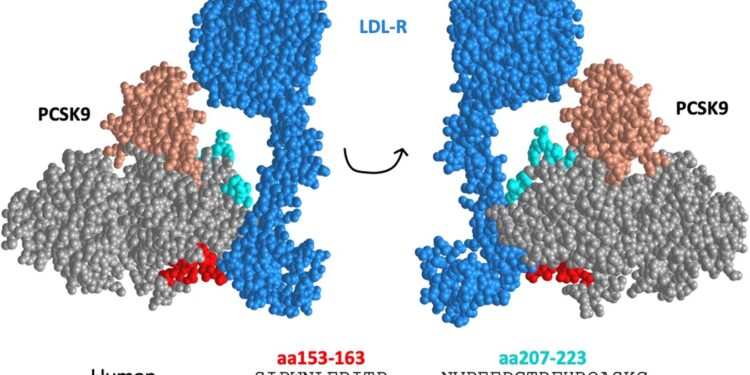The structure of human PCSK9 in complex with LDL-R. LDL-R is shown in blue and the prodomain and catalytic domain of PCSK9 are shown in salmon and gray, respectively. Targeted PCSK9 epitopes are shown in red (amino acids 153 to 163) and cyan (amino acids 207 to 223). The amino acid sequences of these epitopes of human, rhesus macaque, and mouse PCSK9 are shown; residues that differ from the human sequence are shown in magenta. Credit: NPC vaccines (2023). DOI: 10.1038/s41541-023-00743-6
Nearly two in five American adults have high cholesterol, according to the Centers for Disease Control and Prevention (CDC). Untreated high cholesterol can lead to heart disease and stroke, which are two of the leading causes of death in the United States worldwide; Cardiovascular diseases claim nearly 18 million lives each year, according to the World Health Organization.
A new vaccine developed by researchers at the University of New Mexico School of Medicine could be a game-changer, providing an inexpensive method to reduce “bad” LDL cholesterol, which creates dangerous plaques that can block blood vessels .
In a recent study published in NPC vaccinesA team led by Bryce Chackerian, Ph.D., Regents Professor in the Department of Molecular Genetics and Microbiology, reported that the vaccines reduced LDL cholesterol almost as effectively as a costly class of drugs called PCSK9 inhibitors.
“We want to try to develop another approach that would be less expensive and more widely applicable, not only in the United States, but also in places that don’t have the resources to afford these very, very expensive therapies,” he said. said Chackerian. .
For a disease with such a profound global impact, one would think that treatments for high cholesterol would be more accessible and affordable. Abinash Achrekar, MD, MPH, has learned firsthand that this is not the case.
Achrekar, a cardiologist, is vice chair and professor of UNM’s Department of Internal Medicine. Not only has he treated countless patients with high cholesterol, but he is a patient himself.
“I’m a cardiologist and I have high cholesterol,” he said. “I was actually diagnosed when I was a young man, around 16 years old.”
Since then, Achrekar said she has used different treatments, like statins — which nearly 200 million people use worldwide — and the PCSK9 monoclonal injection. This is a newer drug that targets the PCSK9 protein; a molecule made in the liver that circulates in the bloodstream and negatively regulates the metabolism of LDL cholesterol.
Basically, the more PCSK9 your body produces, the higher your LDL cholesterol levels will be. Achrekar said biweekly injections to block this protein reduce his bad cholesterol by about 60 percent, but they are expensive and require prior approval from a primary care doctor or cardiologist.
“It takes some time to process them with insurance companies, but they save lives,” he said. “These medications have been shown to reduce not only cholesterol levels, but also the risk of heart attack, stroke and death.”
Chackerian and his colleagues wanted all patients facing this risk to have a treatment option. So, using the vaccine platform technology he developed at UNM, Chackerian partnered with researchers across the United States to create a new vaccine specifically targeting PCSK9.
“The vaccine is based on a non-infectious viral particle,” he explained. “It’s just the shell of a virus, and it turns out we can use that shell of a virus to develop vaccines for all sorts of different things.”
In this case, Chackerian said he stuck tiny pieces of the PCSK9 protein to the surface of these virus particles.
“So your immune system produces a very strong antibody response against this protein involved in controlling cholesterol levels,” he said. “In the animals that we have vaccinated, we are seeing large reductions in cholesterol levels, up to 30%, and this is going to be correlated with a reduction in the risk of heart disease.”
Over the past decade, the vaccine has been tested in mice and monkeys with promising results. Chackerian said the next step would be to find funding to move into vaccine manufacturing and human clinical trials. This process can take years and many millions of dollars, but it is worth it to develop a pure, safe and affordable vaccine.
“Since so many people have high cholesterol levels, it is estimated that if everyone took one of these PCSK9 inhibitor treatments, it would bankrupt the health care system,” Chackerian said.
He estimates his vaccine could cost less than $100 per dose because it is made from a simple and relatively inexpensive bacteria.
“We’re looking at tens of dollars per dose,” he said, and each dose would remain effective for almost a year. “This is a vaccine that we believe can have a global impact. So, not just in the United States, but all over the world, where heart disease is a significant problem.”
Chackerian said his team continues to work hard to achieve this impact.
“We hope to have a vaccine in humans within the next 10 years,” he said.
More information:
Alexandra Fowler et al, A bivalent virus-like particle-based PCSK9 vaccine lowers LDL cholesterol levels in non-human primates, NPC vaccines (2023). DOI: 10.1038/s41541-023-00743-6
Provided by the University of New Mexico
Quote: The future of heart health: researchers develop a vaccine to reduce cholesterol (December 18, 2023) retrieved December 19, 2023 from
This document is subject to copyright. Apart from fair use for private study or research purposes, no part may be reproduced without written permission. The content is provided for information only.



